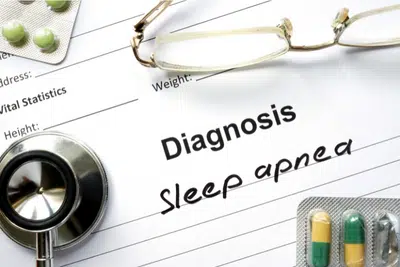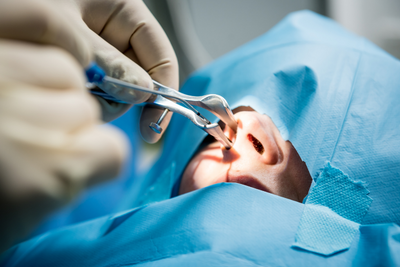Sleep apnea is very commonly associated with excessive loud snoring nightly and occurs frequently. Although frustrating, it’s far from being the most significant or noticeable impact the condition has on your life. The ENT experts at C/V ENT Surgical Group are highly qualified to diagnose and treat your sleep apnea so you can breathe and sleep better.
Snoring happens for various reasons, but it’s most commonly due to your throat muscles relaxing and your airways narrowing during sleep. Other contributing factors occur due to problems in the structure of the nose, such as a deviated septum, large turbinates, severe allergies/sinus problems as well as nasal valve collapse, etc. Sleep apnea affects up to 40 percent of adults at some point in their lives. Obstructive sleep apnea can cause many other problems during sleep and, without timely treatment, can make breathing more difficult.
ENT doctors are ear, nose, and throat specialists. They are highly proficient in health and medical concerns pertaining to the nasal, auditory, and oral cavities. Although plenty of anti-snoring and sleep apnea prevention remedies are available, including CPAP machines, they are not effective or suitable for everyone who suffers from snoring or sleep apnea. Snoring and sleep apnea are medical conditions that benefit best from ENT evaluation and treatment.
How Does Snoring Contribute to Obstructive Sleep Apnea?
In most cases, snoring is nothing too serious to worry about unless it’s keeping your bed partner from sleeping well. However, many people who snore remain unaware or are in denial about their problem. Snoring is notorious for ruining relationships, social confidence, and household occupants’ ability to sleep well at night. Medically, snoring can disrupt normal airflow, sleep hygiene, and lead to chronic health problems, such as sleep apnea and other respiratory conditions, or even high blood pressure.
Risk factors include:
- Overweight or obesity
- Hypertension
- Allergies
- Nasal congestion
- Chronic sinus infections
- Snoring
- Family history of snoring or sleep apnea
- Restricted nasal, throat, or mouth airways
Obstructive sleep apnea is also common in children and is often associated with abnormal adenoid and tonsil tissues.
Symptoms of Sleep Apnea
Problems like snoring and sleep problems occur more often in overweight individuals and tend to worsen with age. OSA is characterized as multiple pauses in breathing that’s caused by clogged or collapsed upper airways. When loud snoring interrupts normal airflow and causes recurring episodes of obstructed breathing, obstructive sleeping apnea occurs. Each sleep apnea episode causes involuntary pauses in breathing that can last 10 seconds or longer.
It’s not unusual for patients to experience multiple incidents at night. Each episode reduces blood oxygen and increases cardiac activity as the lungs and heart work harder to function normally. Sleep apnea causes snorers to sleep lightly as they breathe in less air. Obstructive sleep apnea is also a significant cause of low productivity and decreased cognitive function.
Symptoms of this sleeping disorder include snoring and breathing difficulties. You might be affected if you snore loudly and wake tired and unrested. Loud snoring may be related to sleep apnea, but not always. Also, some patients don’t snore while sleeping. According to the Sleep Foundation, sleep apnea causes other unusual health changes like headaches, rashes, anxiety, depression, and teeth grinding (bruxism).
Below are the most common symptoms associated with sleep apnea:
- Loud snoring
- Choking or gasping during sleep
- Daytime fatigue and sleepiness
- Stiff and tight muscles in the head, neck, or shoulders
- Stress
Sometimes symptoms of obstructive sleep apnea overlap with other medical disorders. Treatment delays can lead to additional medical concerns and possible complications. Timely medical attention is necessary for an optimal outcome.
How Can an ENT Doctor Fix Sleep Apnea?
To diagnose sleep apnea, an examination of the nose, throat and neck is necessary. Patients should be prepared to discuss their symptoms with the specialist. Diagnostic tests may also be necessary in order for the ENT physician to provide the most suitable and optimal sleep apnea treatment recommendations for relief.
ENT Treatment and Sleep Apnea Surgery
Treatment depends on the diagnosis. An examination can reveal if nasal allergies, infections, nasal/sinus deformities, enlarged tonsils or adenoids are the reason for your sleep apnea. Surgery, CPAP or oral appliances can be used to treat sleep apnea. Sleep apnea surgery is primarily an outpatient procedure.
CV/ENT Surgical Group offers the following ENT treatments for sleep apnea.
Laser Assisted Uvulopalatoplasty (LAUP) is a procedure that involves the use of a radio frequency laser to remove palatal and uvular tissue from the soft palate. Most patients resume their normal activities within the next day. LAUP can also be performed with soft palate channeling to stiffen the palate.
Nasal/Sinus surgery including septoplasty, nasal valve repair, turbinate reduction, balloon sinus surgery and/or minimally invasive image-guided endoscopic sinus surgery.
Tonsillectomy/Adenoidectomy
Additional ENT treatments that are beneficial for many sleep apnea surgery patients include tongue base reduction surgery and/or UP3.
To see an ENT for obstructive sleep apnea surgery or treatment, contact C/V ENT Surgical Group at (818) 431-2989.


